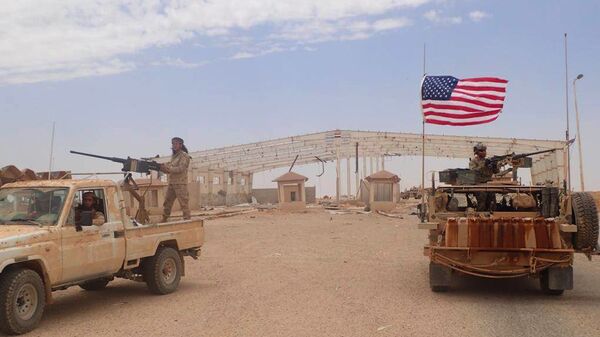"We say that the location of the US base is contrary to common sense, especially now, when Syrian territory has been liberated from IS [Daesh] formations. There is no one left, there is no threat to you from the territory of Syria. What is there and for what purpose? The answers are still unintelligible. However, new terrorist groups may appear there," Gerasimov said.
The statement follows the US Special Presidential Envoy for the Global Coalition to Counter Daesh Brett McGurk's announcement made earlier in December, concerning the US military presence at the At-Tanf garrison as well as in other areas of the country. According to McGurk, the coalition will maintain its presence in the country to guarantee that the Daesh terrorists don't return to the liberated areas.
However, the Russian reconciliation center in Syria, as well as the Russian Defense Ministry have accused the US of establishing a training camp near the al-Rukban refugee camp to create a new "moderate opposition" out of various militia groups and blocking humanitarian aid to the refugees in the camp, banning an approach "closer than 55 kilometers [34 miles] to the compound.
In one of his latest statements, Gerasimov already explained that former Daesh terrorists have formed the so-called New Syrian Army, whose task is to destabilize the situation in the country.
READ MORE: Russia General Staff Chief Explains Who Trained Daesh Leaders in Syria
Meanwhile, the Syrian government forces have recently ceased their offensive in the southwest of Damascus after the Jabhat Fatah al-Sham terrorist group was defeated in the area and started engaging in talks.
READ MORE: Syrian Army Halts Operation Near Damascus After Terrorists' Defeat — Reports
Terrorist Tactics
The chief of the Russian General Staff went on to reveal the tactics, used by militants: in particular, car bombs rigged with explosives, and the response measures of Russian and Syrian troops.
READ MORE: Fight Against Terrorism 'Must Come From Within Muslim Communities,' Analyst Says
"Adjustments are being constantly made, because the approaches, forms and ways of actions are changing. In the beginning the use of car bombs was low, however, later it became more widespread… Thus, during the battle for Deir ez-Zor, for other settlements in the Euphrates River valley, the use of car bombs have reached almost a mass scale," Gerasimov said.
READ MORE: US-Led Coalition Estimated 1,000 Daesh Terrorists Remaining in Syria
Gerasimov noted that at the beginning of the Russian operation, militants used two or three car bombs in one battle, however, later, they started to use seven or eight vehicle-borne improvised explosive devices, adding that with the help of such cars with suicide attackers, each of which can carry over 400 kilograms [882 pounds] of explosives, the jihadists managed to escape from Aleppo in 2016.




